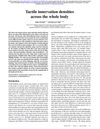 4 citations,
April 2020 in “bioRxiv (Cold Spring Harbor Laboratory)”
4 citations,
April 2020 in “bioRxiv (Cold Spring Harbor Laboratory)” The skin has about 230,000 touch-sensitive nerve fibers, with high concentrations in the hands and face.
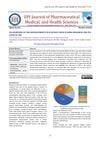 August 2024 in “UPI Journal of Pharmaceutical Medical and Health Sciences”
August 2024 in “UPI Journal of Pharmaceutical Medical and Health Sciences” PRP shows promise in musculoskeletal rehabilitation but needs standardized reporting for better outcomes.
 November 2019 in “Neuro-oncology”
November 2019 in “Neuro-oncology” Rind-based techniques can lower scalp radiation dose and reduce hair loss in brain cancer treatment.
[object Object] 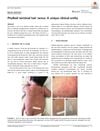 August 2018 in “Pediatric Dermatology”
August 2018 in “Pediatric Dermatology” A baby had a unique skin condition with a pale patch and surrounding dark hairs, not linked to other health issues.
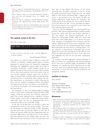 April 2016 in “British Journal of Dermatology”
April 2016 in “British Journal of Dermatology” Eyelashes are important for looks and eye protection, and more people are treating sparse eyelashes; more research is needed to understand eyelash biology and improve treatments.
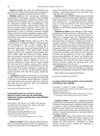
Botox is effective for urinary incontinence, chronic migraines, and male pattern hair loss, and a new test for Botox antibodies is more humane.
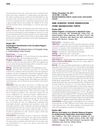
The man's scalp tightness after hair surgery affects his life and work, and it's unclear if it's due to the surgery or a mental health issue.
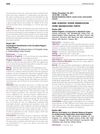
The data suggests that dosing differences can help manage spasticity in patients with upper motor neuron dysfunction.
 January 2020 in “The Journal of Sexual Medicine”
January 2020 in “The Journal of Sexual Medicine” Using 5α-reductase inhibitors for hair loss can cause lasting sexual, physical, mental, and vascular health issues in men, even after stopping the medication.
 1057 citations,
November 2011 in “Annals of Biomedical Engineering”
1057 citations,
November 2011 in “Annals of Biomedical Engineering” Low-level Laser Therapy may help reduce inflammation, pain, and aid healing, but more research is needed to confirm its effectiveness and establish standard treatment guidelines.
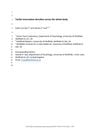 142 citations,
September 2020 in “Journal of neurophysiology”
142 citations,
September 2020 in “Journal of neurophysiology” Young adults have about 230,000 tactile nerve fibers, decreasing 5-8% per decade with age.
 65 citations,
February 2015 in “Neuro-Oncology”
65 citations,
February 2015 in “Neuro-Oncology” Alisertib was found to be an effective and tolerable treatment for children with recurrent brain tumors.
 46 citations,
December 2003 in “Advances in neonatal care”
46 citations,
December 2003 in “Advances in neonatal care” Assessing newborn scalp hair can reveal important health information.
 42 citations,
February 2014 in “Stem Cells and Development”
42 citations,
February 2014 in “Stem Cells and Development” Vitamin C helps adipose-derived stem cells grow and may support hair growth.
 40 citations,
December 2019 in “Neurobiology of Stress”
40 citations,
December 2019 in “Neurobiology of Stress” Neuroactive steroids show promise for treating mental and neurological disorders by targeting GABA_A receptors.
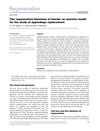 39 citations,
April 2015 in “Regeneration”
39 citations,
April 2015 in “Regeneration” Lizards can regrow their tails, and studying this process helps understand scar-free healing and limb regeneration.
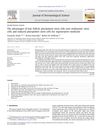 33 citations,
October 2010 in “Journal of Dermatological Science”
33 citations,
October 2010 in “Journal of Dermatological Science” Hair follicle stem cells are a practical and ethical option for nerve repair in regenerative medicine.
 29 citations,
March 2016 in “Cell cycle/Cell cycle (Georgetown, Tex. Online)”
29 citations,
March 2016 in “Cell cycle/Cell cycle (Georgetown, Tex. Online)” Isoproterenol helps hair follicle stem cells turn into beating heart muscle cells.
 23 citations,
January 2014 in “Molecular Therapy”
23 citations,
January 2014 in “Molecular Therapy” Applying a special DNA plasmid to the skin can make it thicker and stronger.
 21 citations,
August 2016 in “Translational Andrology and Urology”
21 citations,
August 2016 in “Translational Andrology and Urology” Delayed ejaculation is a complex issue caused by psychological, biological, and lifestyle factors, requiring a holistic treatment approach.
 21 citations,
December 2012 in “Maturitas”
21 citations,
December 2012 in “Maturitas” Testosterone implants in women require pharmacological dosing to be effective and are generally safe and well-tolerated.
 18 citations,
March 2006 in “Expert Review of Neurotherapeutics”
18 citations,
March 2006 in “Expert Review of Neurotherapeutics” The document concludes that managing side effects of MS therapies is crucial for treatment success and patient adherence.
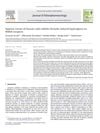 17 citations,
February 2009 in “Journal of Ethnopharmacology”
17 citations,
February 2009 in “Journal of Ethnopharmacology” Asiasari radix extract may relieve certain types of pain by affecting GABA and NMDA receptors.
 16 citations,
January 2016 in “Journal of Investigative Dermatology”
16 citations,
January 2016 in “Journal of Investigative Dermatology” Mice without the IL-6 gene had more hair growth after injury due to higher activity of a related protein, Stat3.
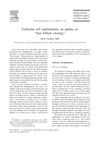 15 citations,
May 2004 in “Facial Plastic Surgery Clinics of North America”
15 citations,
May 2004 in “Facial Plastic Surgery Clinics of North America” The document concludes that while "hair follicle cloning" shows promise for unlimited donor hair, it faces challenges with consistency and safety in humans.
 14 citations,
October 2018 in “Brain Research Bulletin”
14 citations,
October 2018 in “Brain Research Bulletin” Exosomes help nerve fibers grow by affecting specific cell signaling pathways.
 14 citations,
September 2015 in “Ophthalmic plastic and reconstructive surgery”
14 citations,
September 2015 in “Ophthalmic plastic and reconstructive surgery” Surgical removal of abnormal fat pads fixed the woman's eyelid issue caused by likely silicone injections.
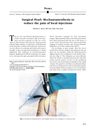 13 citations,
April 2001 in “Journal of The American Academy of Dermatology”
13 citations,
April 2001 in “Journal of The American Academy of Dermatology” Using a vibrating device during injections can help reduce pain.
[object Object]  11 citations,
November 2020 in “Movement Disorders Clinical Practice”
11 citations,
November 2020 in “Movement Disorders Clinical Practice” A man developed neurological issues from SARS-CoV-2 without severe breathing problems, worsening to death.
 11 citations,
August 2014 in “Current Urology Reports”
11 citations,
August 2014 in “Current Urology Reports” Medications for enlarged prostate can cause sexual side effects like reduced libido, erectile dysfunction, and ejaculatory problems.






























